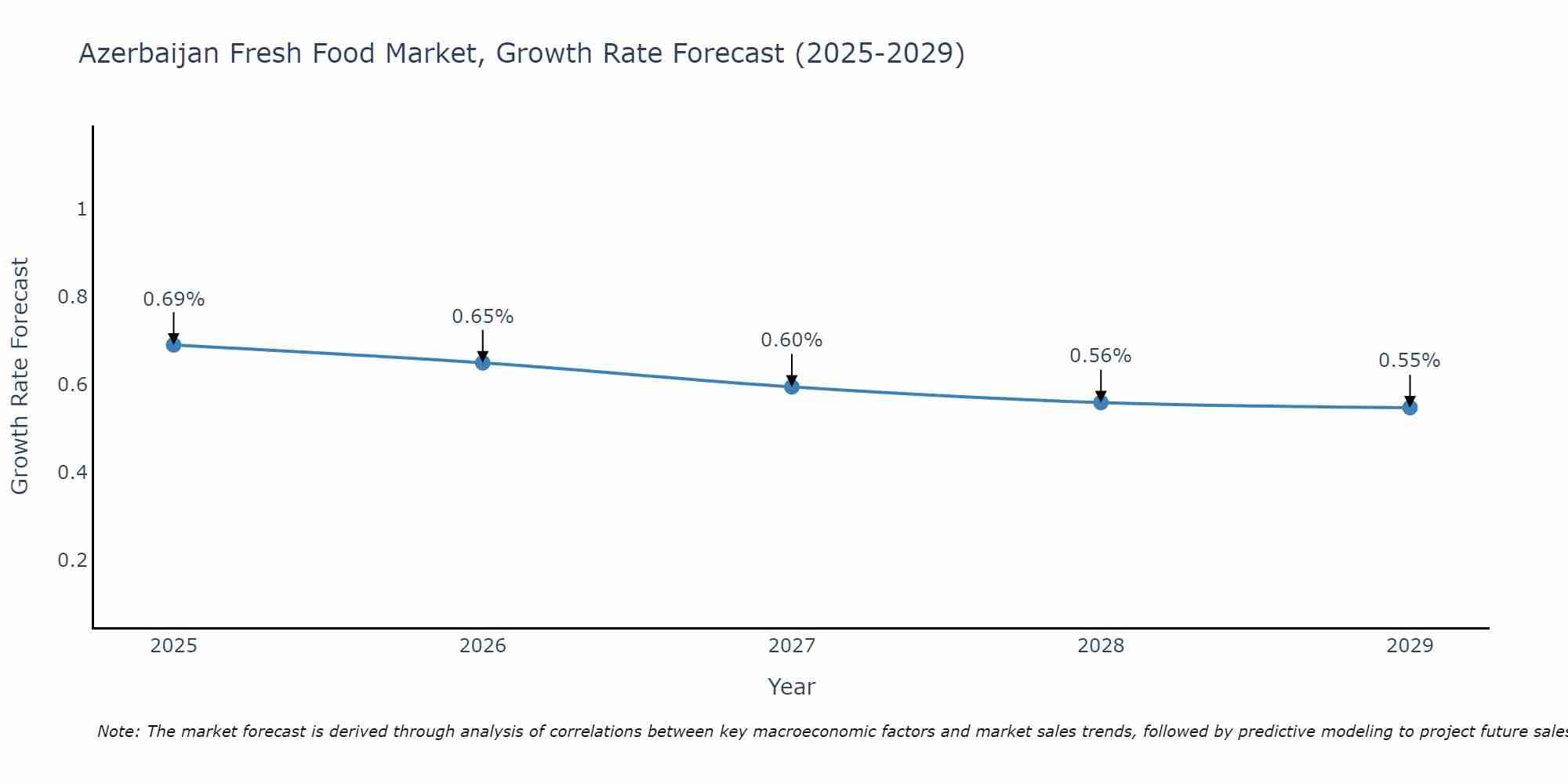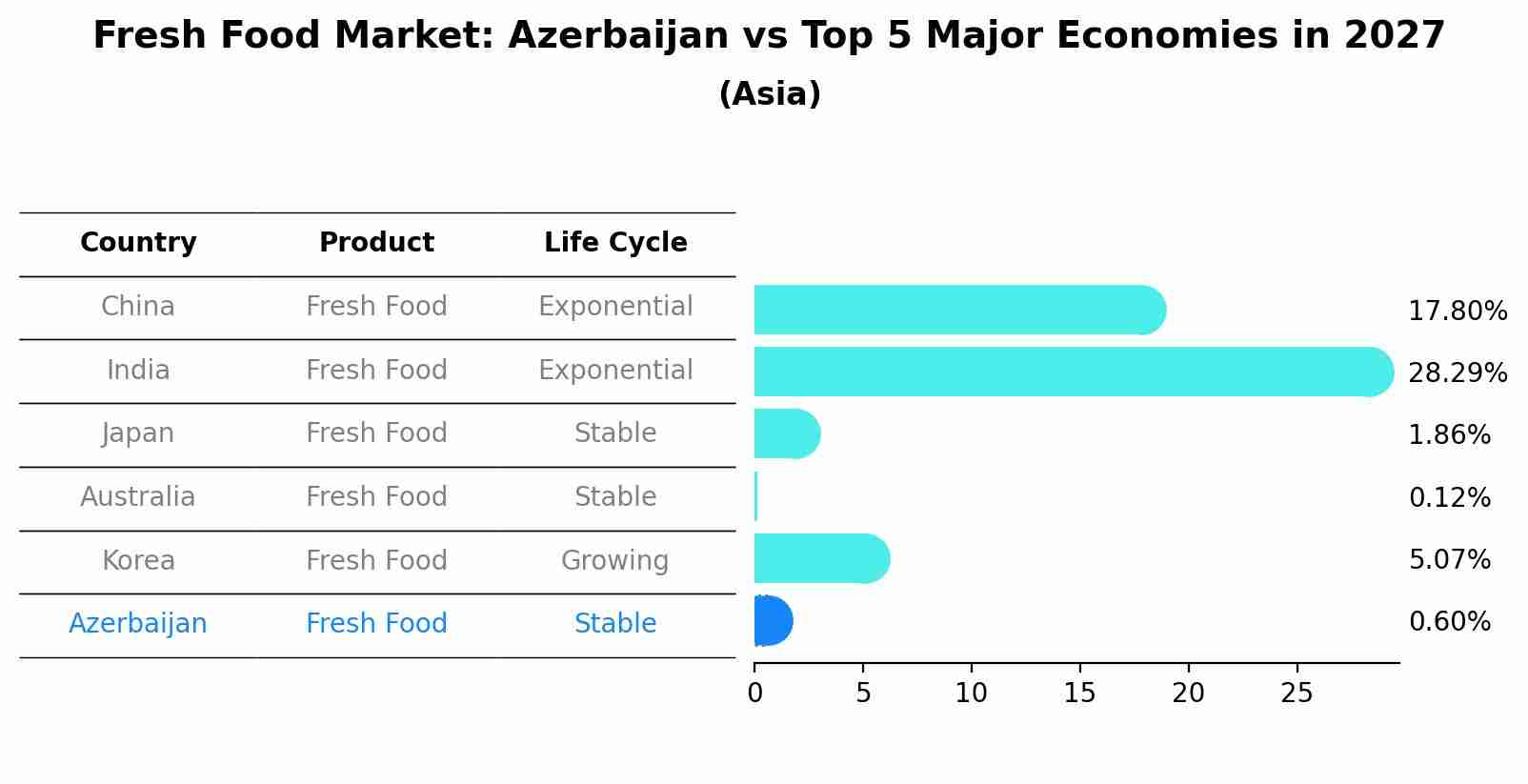Azerbaijan Fresh Food Market (2025-2031) Outlook | Growth, Size, Value, Trends, Industry, Revenue, Companies, Forecast, Analysis & Share
| Product Code: ETC382137 | Publication Date: Aug 2022 | Updated Date: Jul 2025 | Product Type: Market Research Report | |
| Publisher: 6Wresearch | Author: Dhaval Chaurasia | No. of Pages: 75 | No. of Figures: 35 | No. of Tables: 20 |
Azerbaijan Fresh Food Market Size Growth Rate
The Azerbaijan Fresh Food Market could see a tapering of growth rates over 2025 to 2029. Starting high at 0.69% in 2025, the market steadily declines to 0.55% by 2029.

Fresh Food Market: Azerbaijan vs Top 5 Major Economies in 2027 (Asia)
By 2027, Azerbaijan's Fresh Food market is forecasted to achieve a stable growth rate of 0.60%, with China leading the Asia region, followed by India, Japan, Australia and South Korea.

Azerbaijan Fresh Food Market Synopsis
The Azerbaijan fresh food market is characterized by a growing demand for high-quality, locally sourced produce and a shift towards healthier eating habits among consumers. Key players in the market include supermarkets, hypermarkets, specialty stores, and online grocery platforms that offer a wide range of fresh fruits, vegetables, meat, dairy products, and seafood. The market is influenced by factors such as increasing disposable income, urbanization, and a rising awareness of the benefits of consuming fresh, organic foods. Additionally, government initiatives to support the agricultural sector and promote food security are driving growth in the market. Overall, the Azerbaijan fresh food market presents opportunities for suppliers and retailers to cater to the evolving preferences of consumers and capitalize on the growing demand for fresh and nutritious food products.
Azerbaijan Fresh Food Market Trends
In the Azerbaijan Fresh Food Market, there is a growing demand for organic and locally sourced produce as consumers are increasingly prioritizing health and sustainability. Convenience is also a key trend, with a rising demand for pre-cut, pre-packaged, and ready-to-eat fresh food products. E-commerce platforms and online grocery delivery services are gaining popularity, providing consumers with more convenient ways to access fresh food. The market is also seeing a trend towards transparency and traceability, with consumers seeking information on the sourcing and production methods of the fresh food they purchase. Overall, the Azerbaijan Fresh Food Market is evolving to meet the changing preferences and lifestyles of consumers, with a focus on quality, convenience, and sustainability.
Azerbaijan Fresh Food Market Challenges
In the Azerbaijan fresh food market, challenges include limited infrastructure for storage and transportation, leading to issues with maintaining product freshness and quality. Additionally, fluctuating weather conditions and natural disasters can impact crop yields and availability of fresh produce. Competition from imported goods can also pose a challenge for local producers, as imported products may be cheaper due to lower production costs in other countries. Furthermore, consumer preferences and buying behavior are evolving, with increasing demand for organic, locally-sourced, and sustainably-produced fresh foods, which may require market players to adapt their offerings and practices. Overall, addressing these challenges requires investments in infrastructure, technology, and sustainable farming practices to ensure a thriving fresh food market in Azerbaijan.
Azerbaijan Fresh Food Market Investment Opportunities
The Azerbaijan fresh food market presents promising investment opportunities due to its growing demand for high-quality, locally sourced produce. With an increasing focus on health and wellness among consumers, there is a rising preference for fresh, organic, and sustainable food options. Investors can consider opportunities in establishing vertical farms, greenhouse operations, or organic farms to cater to this demand. Additionally, investing in distribution networks and cold chain infrastructure can help ensure the efficient and timely delivery of fresh produce to retailers and consumers. Collaborating with local farmers and producers to improve food quality and safety standards can also be a lucrative investment strategy in the Azerbaijan fresh food market.
Jordan Agar Market Government Policies
In Azerbaijan, the government has implemented various policies to support the fresh food market. These policies include initiatives to promote sustainable agriculture practices, increase food safety standards, and improve market access for small-scale farmers. The government has also invested in infrastructure development to enhance the efficiency of the supply chain and distribution network for fresh food products. Additionally, there are regulations in place to control imports and exports of fresh food items to ensure quality and safety standards are met. Overall, these government policies aim to foster growth and competitiveness in the Azerbaijan fresh food market while ensuring consumer health and safety.
Azerbaijan Fresh Food Market Future Outlook
The Azerbaijan fresh food market is poised for steady growth in the coming years, driven by increasing consumer demand for healthy and organic food products. Factors such as rising disposable incomes, changing dietary preferences, and a growing awareness of the importance of fresh produce are expected to fuel this growth. Moreover, the government`s initiatives to support agriculture and promote sustainable farming practices will likely contribute to the expansion of the market. With advancements in technology and logistics, the supply chain for fresh food is becoming more efficient, allowing for a wider variety of products to reach consumers. Overall, the Azerbaijan fresh food market is expected to continue on an upward trajectory, presenting opportunities for both local producers and international players looking to enter the market.
Key Highlights of the Report:
- Azerbaijan Fresh Food Market Outlook
- Market Size of Azerbaijan Fresh Food Market, 2024
- Forecast of Azerbaijan Fresh Food Market, 2031
- Historical Data and Forecast of Azerbaijan Fresh Food Revenues & Volume for the Period 2021 - 2031
- Azerbaijan Fresh Food Market Trend Evolution
- Azerbaijan Fresh Food Market Drivers and Challenges
- Azerbaijan Fresh Food Price Trends
- Azerbaijan Fresh Food Porter's Five Forces
- Azerbaijan Fresh Food Industry Life Cycle
- Historical Data and Forecast of Azerbaijan Fresh Food Market Revenues & Volume By for the Period 2021 - 2031
- Historical Data and Forecast of Azerbaijan Fresh Food Market Revenues & Volume By Fru t nd Vgtbl for the Period 2021 - 2031
- Historical Data and Forecast of Azerbaijan Fresh Food Market Revenues & Volume By t nd ultr for the Period 2021 - 2031
- Historical Data and Forecast of Azerbaijan Fresh Food Market Revenues & Volume By fd for the Period 2021 - 2031
- Historical Data and Forecast of Azerbaijan Fresh Food Market Revenues & Volume By gg for the Period 2021 - 2031
- Historical Data and Forecast of Azerbaijan Fresh Food Market Revenues & Volume By thr for the Period 2021 - 2031
- Historical Data and Forecast of Azerbaijan Fresh Food Market Revenues & Volume By l t n for the Period 2021 - 2031
- Historical Data and Forecast of Azerbaijan Fresh Food Market Revenues & Volume By u rmrkt for the Period 2021 - 2031
- Historical Data and Forecast of Azerbaijan Fresh Food Market Revenues & Volume By rmrkt for the Period 2021 - 2031
- Historical Data and Forecast of Azerbaijan Fresh Food Market Revenues & Volume By Wt nd n rkt for the Period 2021 - 2031
- Historical Data and Forecast of Azerbaijan Fresh Food Market Revenues & Volume By nl n for the Period 2021 - 2031
- Historical Data and Forecast of Azerbaijan Fresh Food Market Revenues & Volume By thr for the Period 2021 - 2031
- Azerbaijan Fresh Food Import Export Trade Statistics
- Market Opportunity Assessment By
- Market Opportunity Assessment By l t n
- Azerbaijan Fresh Food Top Companies Market Share
- Azerbaijan Fresh Food Competitive Benchmarking By Technical and Operational Parameters
- Azerbaijan Fresh Food Company Profiles
- Azerbaijan Fresh Food Key Strategic Recommendations
Frequently Asked Questions About the Market Study (FAQs):
- Single User License$ 1,995
- Department License$ 2,400
- Site License$ 3,120
- Global License$ 3,795
Search
Thought Leadership and Analyst Meet
Our Clients
Related Reports
- Canada Oil and Gas Market (2026-2032) | Share, Segmentation, Value, Industry, Trends, Forecast, Analysis, Size & Revenue, Growth, Competitive Landscape, Outlook, Companies
- Germany Breakfast Food Market (2026-2032) | Industry, Share, Growth, Size, Companies, Value, Analysis, Revenue, Trends, Forecast & Outlook
- Australia Briquette Market (2025-2031) | Growth, Size, Revenue, Forecast, Analysis, Trends, Value, Share, Industry & Companies
- Vietnam System Integrator Market (2025-2031) | Size, Companies, Analysis, Industry, Value, Forecast, Growth, Trends, Revenue & Share
- ASEAN and Thailand Brain Health Supplements Market (2025-2031) | Strategy, Consumer Insights, Analysis, Investment Trends, Opportunities, Growth, Size, Share, Industry, Revenue, Segments, Value, Segmentation, Supply, Forecast, Restraints, Outlook, Competition, Drivers, Trends, Demand, Pricing Analysis, Competitive, Strategic Insights, Companies, Challenges
- ASEAN Bearings Market (2025-2031) | Strategy, Consumer Insights, Analysis, Investment Trends, Opportunities, Growth, Size, Share, Industry, Revenue, Segments, Value, Segmentation, Supply, Forecast, Restraints, Outlook, Competition, Drivers, Trends, Demand, Pricing Analysis, Competitive, Strategic Insights, Companies, Challenges
- Europe Flooring Market (2025-2031) | Outlook, Share, Industry, Trends, Forecast, Companies, Revenue, Size, Analysis, Growth & Value
- Saudi Arabia Manlift Market (2025-2031) | Outlook, Size, Growth, Trends, Companies, Industry, Revenue, Value, Share, Forecast & Analysis
- Uganda Excavator, Crane, and Wheel Loaders Market (2025-2031) | Strategy, Consumer Insights, Analysis, Investment Trends, Opportunities, Growth, Size, Share, Industry, Revenue, Segments, Value, Segmentation, Supply, Forecast, Restraints, Outlook, Competition, Drivers, Trends, Demand, Pricing Analysis, Competitive, Strategic Insights, Companies, Challenges
- Rwanda Excavator, Crane, and Wheel Loaders Market (2025-2031) | Strategy, Consumer Insights, Analysis, Investment Trends, Opportunities, Growth, Size, Share, Industry, Revenue, Segments, Value, Segmentation, Supply, Forecast, Restraints, Outlook, Competition, Drivers, Trends, Demand, Pricing Analysis, Competitive, Strategic Insights, Companies, Challenges
Industry Events and Analyst Meet
Whitepaper
- Middle East & Africa Commercial Security Market Click here to view more.
- Middle East & Africa Fire Safety Systems & Equipment Market Click here to view more.
- GCC Drone Market Click here to view more.
- Middle East Lighting Fixture Market Click here to view more.
- GCC Physical & Perimeter Security Market Click here to view more.
6WResearch In News
- Doha a strategic location for EV manufacturing hub: IPA Qatar
- Demand for luxury TVs surging in the GCC, says Samsung
- Empowering Growth: The Thriving Journey of Bangladesh’s Cable Industry
- Demand for luxury TVs surging in the GCC, says Samsung
- Video call with a traditional healer? Once unthinkable, it’s now common in South Africa
- Intelligent Buildings To Smooth GCC’s Path To Net Zero


















